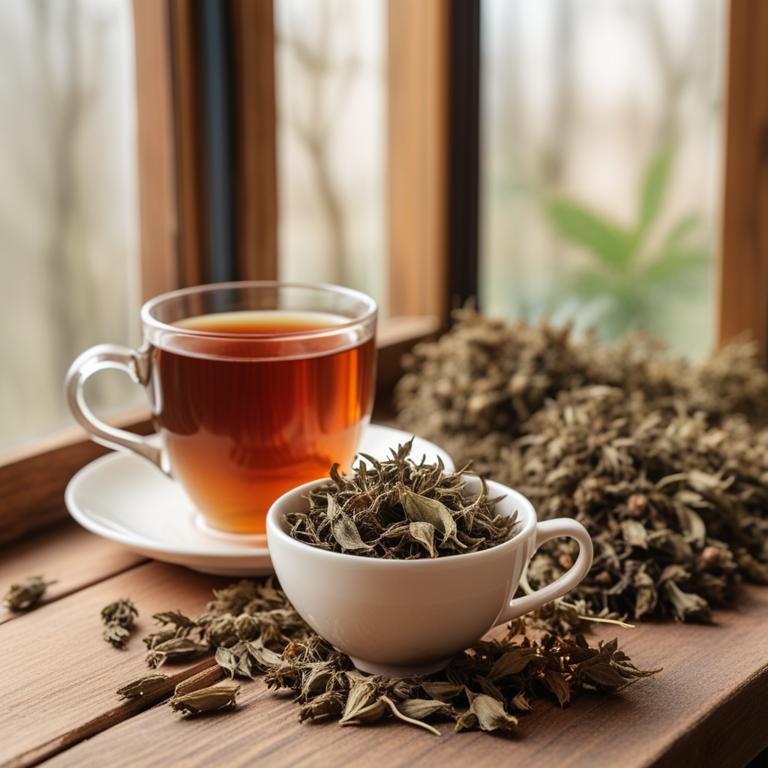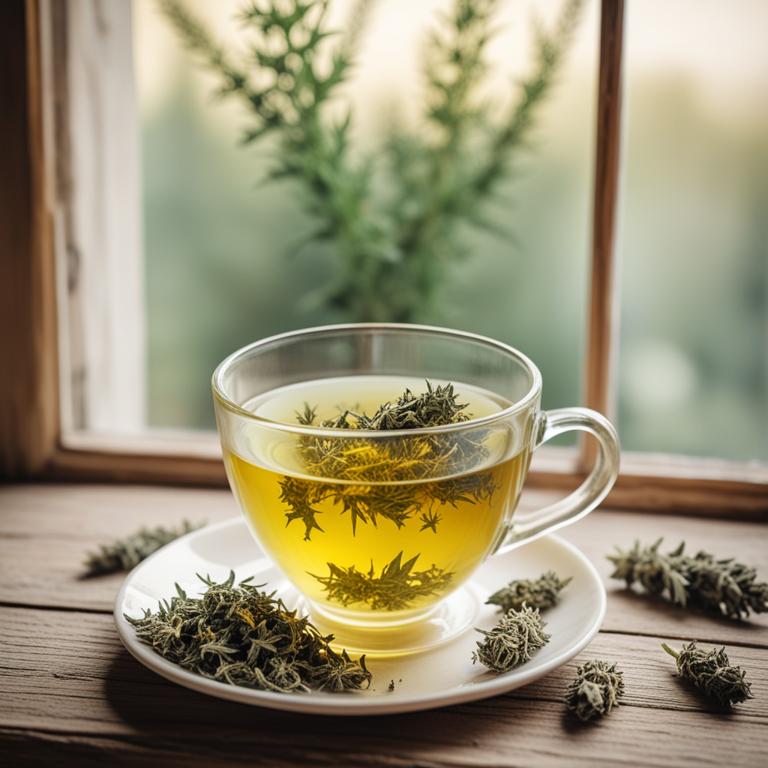7 Herbal Teas For Jaundice

When it comes to jaundice, herbal teas can be a natural and effective way to help alleviate symptoms.
Jaundice is a condition where bilirubin builds up in the blood, causing a yellowish discoloration of the skin and eyes. Silybum marianum, also known as milk thistle, is one herb that's commonly used to treat jaundice. It contains a compound called silymarin, which helps to protect the liver and reduce inflammation. This can help to break down bilirubin and get it out of the body, reducing the symptoms of jaundice. Another herb that's often used to treat jaundice is Glycyrrhiza glabra, also known as licorice root. Licorice root has anti-inflammatory properties that can help to soothe the liver and reduce damage caused by bilirubin buildup.
It also has a compound called glycyrrhizin, which can help to improve liver function and reduce the risk of complications. Ginger, or Zingiber officinale, is another herb that's often used to treat jaundice. It has anti-inflammatory properties that can help to reduce inflammation in the liver and improve digestion. Ginger also has a compound called gingerol, which can help to stimulate digestion and improve liver function. These herbal teas can bring a range of benefits to your life, including improved liver function, reduced inflammation, and a lower risk of complications. They can also help to alleviate symptoms such as fatigue, nausea, and abdominal pain, making it easier to manage the condition.
Additionally, herbal teas are often gentle on the stomach and can be a more natural alternative to prescription medications.
- 1. Silybum marianum
- 2. Glycyrrhiza glabra
- 3. Zingiber officinale
- 4. Curcuma longa
- 5. Rheum palmatum
- 6. Artemisia absinthium
- 7. Melissa officinalis
1. Silybum marianum

Silybum marianum teas contains silymarin, a group of bioactive compounds that include flavonoids, lignans, and polyphenols.
These compounds help protect the liver from damage and promote its natural detoxification processes. Silymarin also has antioxidant properties, which help neutralize free radicals that can contribute to liver inflammation and damage. The flavonoids in silymarin, particularly silibinin, have been shown to improve liver function and reduce levels of bilirubin, a pigment that builds up in the blood during jaundice.
By reducing bilirubin levels and promoting liver health, Silybum marianum teas may be beneficial for individuals with jaundice.
- Get 1 cup of dried Silybum marianum flowers. You can buy them at a health food store or online.
- Use 1 tablespoon of dried flowers for every 1 cup of boiling water.
- Heat 1 cup of water in a pot and bring it to a boil.
- Add the dried flowers to the boiling water and let it steep for 5-7 minutes.
- Strain the tea and drink it 2-3 times a day to help with jaundice symptoms.
2. Glycyrrhiza glabra

Glycyrrhiza glabra teas contains glycyrrhizin, a triterpenoid saponin, and flavonoids, which are responsible for its medicinal properties.
The flavonoids in Glycyrrhiza glabra teas, such as quercetin and kaempferol, have antioxidant and anti-inflammatory effects, which help reduce liver inflammation and improve liver function. Glycyrrhizin has been shown to increase the levels of bile salts in the liver, which helps to improve the flow of bile and reduce jaundice. Glycyrrhizin also has a mild anti-viral effect, which helps to reduce the viral load in cases of viral hepatitis, a common cause of jaundice.
By reducing liver inflammation and improving bile flow, Glycyrrhiza glabra teas can help alleviate the symptoms of jaundice, such as yellowing of the skin and eyes, and improve overall liver health.
- Gather 2 teaspoons of dried Glycyrrhiza glabra root and 1 cup of boiling water.
- Steep the dried root in the boiling water for 5-7 minutes.
- Strain the liquid into a cup and discard the root.
- Add 1 tablespoon of honey to the liquid, if desired, to sweeten the tea.
- Drink the tea 2-3 times a day, as needed, to help alleviate jaundice symptoms.
3. Zingiber officinale

Zingiber officinale teas contains active compounds like gingerols and shogaols, which have anti-inflammatory and antioxidant properties.
These compounds help reduce liver inflammation and improve liver function, which can aid in the treatment of jaundice. The antioxidant properties also help protect the liver from damage caused by free radicals. The anti-inflammatory properties of gingerols and shogaols may help reduce liver congestion and improve bile flow, which is essential for removing bilirubin from the body.
By reducing liver inflammation and improving bile flow, Zingiber officinale teas can help alleviate jaundice symptoms.
- Boil 1 cup of water in a pot.
- Wash 1 tablespoon of fresh ginger root in cold water. Slice it thinly.
- Add the sliced ginger to the boiling water and let it simmer for 5 minutes.
- Strain the tea into a cup and discard the ginger slices.
- Drink the tea warm or at room temperature, 2-3 times a day for jaundice relief.
Zingiber Officinale Tea on Amazon
FGO Organic Ginger Tea, 100 Count, Eco-Conscious Tea Bags, Caffeine Free, Packaging May Vary (Pack of 1)
Disclaimer: We earn a commission if you click this link and make a purchase at no additional cost to you.
4. Curcuma longa

Curcuma longa teas contains bioactive constituents like curcumin, demethoxycurcumin, and bisdemethoxycurcumin.
These compounds have potent antioxidant and anti-inflammatory properties, which can help reduce liver inflammation associated with jaundice. Curcumin, in particular, has been shown to inhibit the production of liver enzymes that are responsible for jaundice, allowing bilirubin levels to return to normal. Additionally, curcuma longa's antioxidant properties help protect liver cells from oxidative damage and promote the healing of liver tissue.
By reducing inflammation and promoting liver health, curcuma longa teas can help alleviate jaundice symptoms and support the recovery of liver function.
- Gather 1 teaspoon of dried Curcuma longa root, 1 cup of water, and a strainer.
- Boil the water in a pot and let it cool for a few minutes.
- Add the 1 teaspoon of Curcuma longa root to the cooled water and let it steep for 5-7 minutes.
- Strain the mixture through a strainer into a cup and discard the root.
- Drink the tea 2-3 times a day for relief from jaundice symptoms.
5. Rheum palmatum

Rheum palmatum teas contains bioactive constituents like rhein, emodin, and chrysophanol, which have been found to have anti-inflammatory and antioxidant properties.
These properties help to reduce liver inflammation and promote liver regeneration, which can aid in the treatment of jaundice. The flavonoids and phenolic acids in Rheum palmatum teas also have antimicrobial properties, which can help to reduce the growth of bacteria and fungi that can contribute to liver damage. Additionally, the tea's ability to stimulate liver function and improve bile flow can help to reduce the levels of bilirubin in the blood, which is a common symptom of jaundice.
Rheum palmatum teas' combination of anti-inflammatory, antioxidant, and antimicrobial properties makes it a potential treatment for jaundice.
- Gather 1 cup of fresh Rheum palmatum roots and clean them under running water.
- Dry the roots in the shade for 2-3 days or until they become dry and brittle.
- Crush the dried roots into small pieces using a mortar and pestle.
- Steep 1 teaspoon of the crushed root in 1 cup of boiling water for 5-7 minutes.
- Strain the tea and drink it 2-3 times a day to help alleviate jaundice symptoms.
6. Artemisia absinthium

Artemisia absinthium teas contains a high amount of sesquiterpene compounds, particularly thujone and artabsin, which have been found to have a hepatoprotective effect.
This means they help protect the liver and promote liver function, which is essential in treating jaundice. The tea also contains flavonoids like luteolin and apigenin, which have antioxidant properties that reduce liver inflammation and oxidative stress. Artemisinin, another key component, has been shown to have anti-inflammatory and immunomodulatory effects that aid in liver regeneration and recovery.
By reducing liver inflammation and promoting regeneration, Artemisia absinthium teas can help alleviate the symptoms of jaundice and support the body's natural healing process.
- Gather 2 tablespoons of dried Artemisia absinthium leaves.
- Boil 1 cup of water in a pot.
- Add the 2 tablespoons of Artemisia absinthium leaves to the boiling water.
- Reduce heat and let it simmer for 5-7 minutes.
- Strain the tea and drink 1 cup, 2-3 times a day.
7. Melissa officinalis

Melissa officinalis teas contains rosmarinic acid, which is a powerful antioxidant that helps reduce liver inflammation.
This tea also contains flavonoids and terpenoids, which have anti-inflammatory and antiviral properties that help combat the underlying causes of jaundice. The rosmarinic acid in Melissa officinalis tea has been shown to inhibit the production of liver enzymes that contribute to jaundice, while also reducing oxidative stress in the liver cells. The antiviral properties of the tea's constituents help fight off viral infections that can cause liver damage and jaundice.
By reducing liver inflammation and fighting off infections, Melissa officinalis tea can help alleviate the symptoms of jaundice and promote liver health.
- Gather 1 cup of Melissa officinalis leaves or 1 teaspoon of dried Melissa officinalis.
- Heat 1 cup of water in a pot.
- Add the Melissa officinalis leaves or dried Melissa officinalis to the hot water.
- Let it steep for 5-10 minutes, then strain the liquid.
- Drink 1/2 cup of the tea, 2-3 times a day, after consulting a doctor for jaundice treatment.